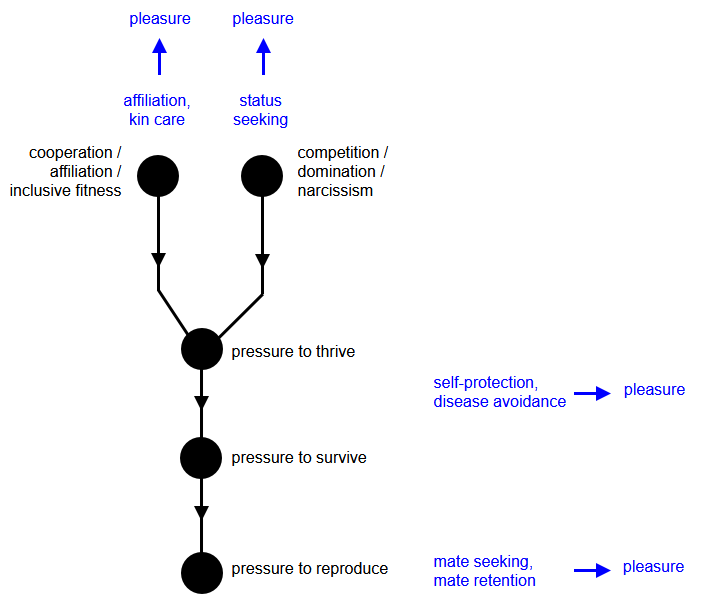The evolution of should-

Normativity and goals
Research on goal pursuit in general has shown that two important signatures of goal
fulfillment are positive affect and inhibition of goal-
Moral Psychology as Accountability -
Normativity is should-
Normativity originates in the pressure to reproduce. In order to reproduce, we have to survive; in order to to survive, we have to do well; to thrive; to flourish. Therefore there are corresponding pressures to survive and to do well.
We hypothesise that the pressure to reproduce evolved early in the history of life
on Earth, and originated in the reproduction of living forms within an environment
of limited physical resources. Hence, there was competition for resources, and those
organisms (or more precisely, organisms containing certain alleles or versions of
genes) that out-
In order to survive and thrive, a bacterium will attempt to move itself away from a noxious environment towards a more pleasant one (Nesse, 2004).
A spider will attempt to build its web the “correct” way -
If reproduction is the primary goal, then survival and doing well are secondary goals of almost equal importance. For most animals, this means fulfilling basic biological and emotional needs. Humans are more flexible in our behaviour, and we have other goals too, such as listening to good music or reading a good book. Arguably, “doing well” means fulfilling any goal we have.
Goals, fitness and adaptation
The goals of a non-
Kenrick (2016) describes six human “fundamental motivations” that are highly related
to fitness: self-
For flexible humans, not all goals are adaptive, in the sense that not all goals
lead to long-
Meaning and value
We hypothesise that X has meaning for me to the extent that X is relevant to my goals; and that Y has value for me to the extent that Y can help me to achieve my goals.
What is a value?
We hypothesise that a value is either something we value in itself (e.g., fun, fame) or something we value because it is a policy for achieving a goal (e.g., courage, kindness).
Fact-
The Scottish philosopher David Hume (1711-
The present account of normativity comes close to bridging the fact/value divide, but does not do so completely. It produces a “descriptive ought”: a description of why I feel I ought to X; rather than logical reasons why I ought to X.
Competition and cooperation
The evolution of cooperation requires that its benefits reach all contributing parties in roughly similar amounts. Natural selection works on every individual’s relative advantage compared with others; hence, gaining an absolute benefit is insufficient. If individuals were satisfied with any absolute benefit, they might still face negative fitness consequences if they were doing less well than competing others. It makes sense, therefore, to compare one's gains with those of others.
Sarah F Brosnan and Frans B M de Waal – "Evolution of responses to (un)fairness" (2014)
Cooperation has win-
References
Brosnan, Sarah F and Frans B M de Waal – “Evolution of responses to (un)fairness”: Science vol 346, issue 6207, 17 October 2014
Chapais, Bernard – “Primeval Kinship – how pair-
Curry, Oliver Scott; Daniel Austin Mullins; and Harvey Whitehouse -
Dill, Brendan & Darwall, Stephen -
Kenrick, Douglas T -
Nesse, Randolph M – “Natural selection and the elusiveness of happiness”: The Royal Society, 31 August 2004
Perry, Simon -
de Waal, Frans B M – “Natural normativity: The 'is' and 'ought' of animal behavior”;
Behaviour 151, 185-